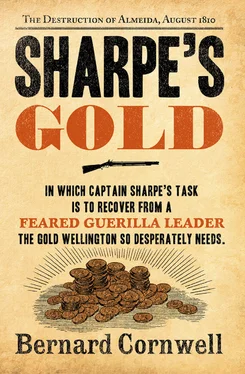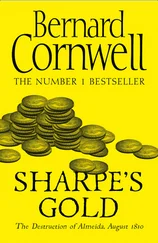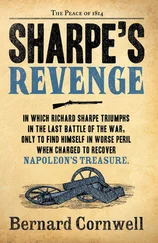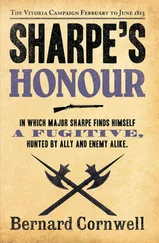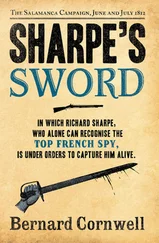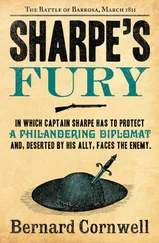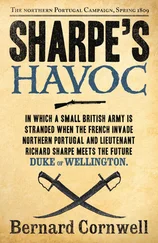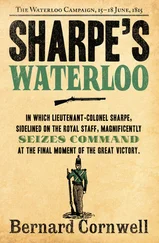SHARPE’S
GOLD
Richard Sharpe and the Destruction of
Almeida, August 1810
BERNARD CORNWELL
This novel is a work of fiction.
The incidents and some of the characters portrayed in it, while based on real historical events and figures, are the work of the author’s imagination.
Published by HarperCollins Publishers Ltd
1 London Bridge Street
London SE1 9GF
www.harpercollins.co.uk
First published in Great Britain by Collins 1981
Copyright © Rifleman Productions Ltd 1981
Bernard Cornwell asserts the moral right to be identified as the author of this work
A catalogue record for this book is available from the British Library
All rights reserved under International and Pan-American Copyright Conventions. By payment of the required fees, you have been granted the non-exclusive, non-transferable right to access and read the text of this ebook on-screen. No part of this text may be reproduced, transmitted, down-loaded, decompiled, reverse engineered, or stored in or introduced into any information storage and retrieval system, in any form or by any means, whether electronic or mechanical, now known or hereinafter invented, without the express written permission of HarperCollins ebooks
HarperCollins Publishers has made every reasonable effort to ensure that any picture content and written content in this ebook has been included or removed in accordance with the contractual and technological constraints in operation at the time of publication
Source ISBN: 9780006173144
Ebook Edition © March 2012 ISBN: 9780007338672
Version: 2017-05-06
‘The insubordinate, sarcastic and oversexed Sharpe returns … Cornwell delivers the usual mix of strategy and strength – classic battle scenes and plenty of fisticuffs’
Daily Mirror
This book is for
Andrew Gardner
with much gratitude
For a soldier I listed, to grow great in fame.
And be shot at for sixpence a day.
CHARLES DIBDIN 1745 – 1814
Table of Contents
Title Page
Copyright
Praise
Dedication
Epigraph
Map
Chapter One
Chapter Two
Chapter Three
Chapter Four
Chapter Five
Chapter Six
Chapter Seven
Chapter Eight
Chapter Nine
Chapter Ten
Chapter Eleven
Chapter Twelve
Chapter Thirteen
Chapter Fourteen
Chapter Fifteen
Chapter Sixteen
Chapter Seventeen
Chapter Eighteen
Chapter Nineteen
Chapter Twenty
Chapter Twenty-One
Chapter Twenty-Two
Chapter Twenty-Three
Chapter Twenty-Four
Epilogue
Keep Reading
Historical Note
Sharpe’s Story
About the Author
Also by Bernard Cornwell
The SHARPE Series (in chronological order)
The SHARPE Series (in order of publication)
About the Publisher
The war was lost; not finished, but lost. Everyone knew it, from Generals of Division to the whores of Lisbon: that the British were trapped, trussed, ready for cooking, and all Europe waited for the master chef himself, Bonaparte, to cross the mountains and put his finishing touch to the roast. Then, to add insult to imminent defeat, it seemed that the small British army was not worthy of the great Bonaparte’s attention. The war was lost.
Spain had fallen. The last Spanish armies had gone, butchered into the history books, and all that was left was the fortress harbour of Cádiz and the peasants who fought the guerrilla , the ‘little war’. They fought with Spanish knives and British guns, with ambush and terror, till the French troops loathed and feared the Spanish people. But the little war was not the war, and that, everyone said, was lost.
Captain Richard Sharpe, once of His Majesty’s 95th Rifles, now Captain of the Light Company of the South Essex Regiment, did not think that the war was lost, although, despite that, he was in a foul mood, morose and irritable. Rain had fallen since dawn and had turned the dust of the road’s surface into slick, slippery mud and made his Rifleman’s uniform clammy and uncomfortable. He marched in solitary silence, listening to his men chatter, and Lieutenant Robert Knowles and Sergeant Patrick Harper, who both would normally have sought his company, let him alone. Lieutenant Knowles had commented on Sharpe’s mood, but the huge Irish Sergeant had shaken his head.
‘There’s no chance of cheering him up, sir. He likes being miserable, so he does, and the bastard will get over it.’
Knowles shrugged. He rather disapproved of a Sergeant calling a Captain a ‘bastard’, but there was no point in protesting. The Sergeant would look innocent and assure Knowles that the Captain’s parents had never married, which was true, and anyway Patrick Harper had fought beside Sharpe for years and had a friendship with the Captain that Knowles rather envied. It had taken Knowles months to understand the friendship, which was not, as many officers thought, based on the fact that Sharpe had once been a private soldier, marching and fighting in the ranks, and now, elevated to the glories of the officers’ mess, still sought out the company of the lower ranks. ‘Once a peasant, always a peasant,’ an officer had sneered, and Sharpe had heard, looked at the man, and Knowles had seen the fear come under the impact of those chilling, mocking eyes. Besides, Sharpe and Harper did not spend off-duty time together; the difference in rank made that impossible. But still, behind the formal relationship, Knowles saw the friendship. Both were big men, the Irishman hugely strong, and both confident in their abilities. Knowles could never imagine either out of uniform. It was as if they had been born to the job and it was on the battlefield, where most men thought nervously of their own survival, that Sharpe and Harper came together in an uncanny understanding. It was almost, Knowles thought, as if they were at home on a battlefield, and he envied them.
He looked up at the sky, at the low clouds touching the hilltops either side of the road. ‘Bloody weather.’
‘Back home, sir, we’d call this a fine day!’ Harper grinned at Knowles, the rain dripping off his shako, and then turned to look at the Company, who followed the fast-marching figure of Sharpe. They were straggling a little, slipping on the road, and Harper raised his voice. ‘Come on, you Protestant scum! The war’s not waiting for you!’
He grinned at them as he shouted, proud they had outmarched the rest of the Regiment, and happy that, at last, the South Essex was marching north to where the summer’s battles would be fought. Patrick Harper had heard the rumours – everyone had – of the French armies and their new commander, but Patrick Harper did not intend to lose any sleep over the future even though the South Essex was pitifully under strength. Replacements had sailed from Portsmouth in March, but the convoy had been hit by a storm, and, weeks later, rumours came of hundreds of bodies washed ashore on the southern Biscay beaches, and now the Regiment must fight with less than half its proper number. Harper did not mind. At Talavera the army had been outnumbered two to one, and tonight, in the town of Celorico, where the army was gathering, there would be women in the streets and wine in the shops. Life could be a lot worse for a lad from Donegal, and Patrick Harper began whistling.
Sharpe heard the whistling and checked his impulse to snap at the Sergeant, recognizing it as pure irritation, but he was annoyed by Harper’s customary equanimity.
Читать дальше
